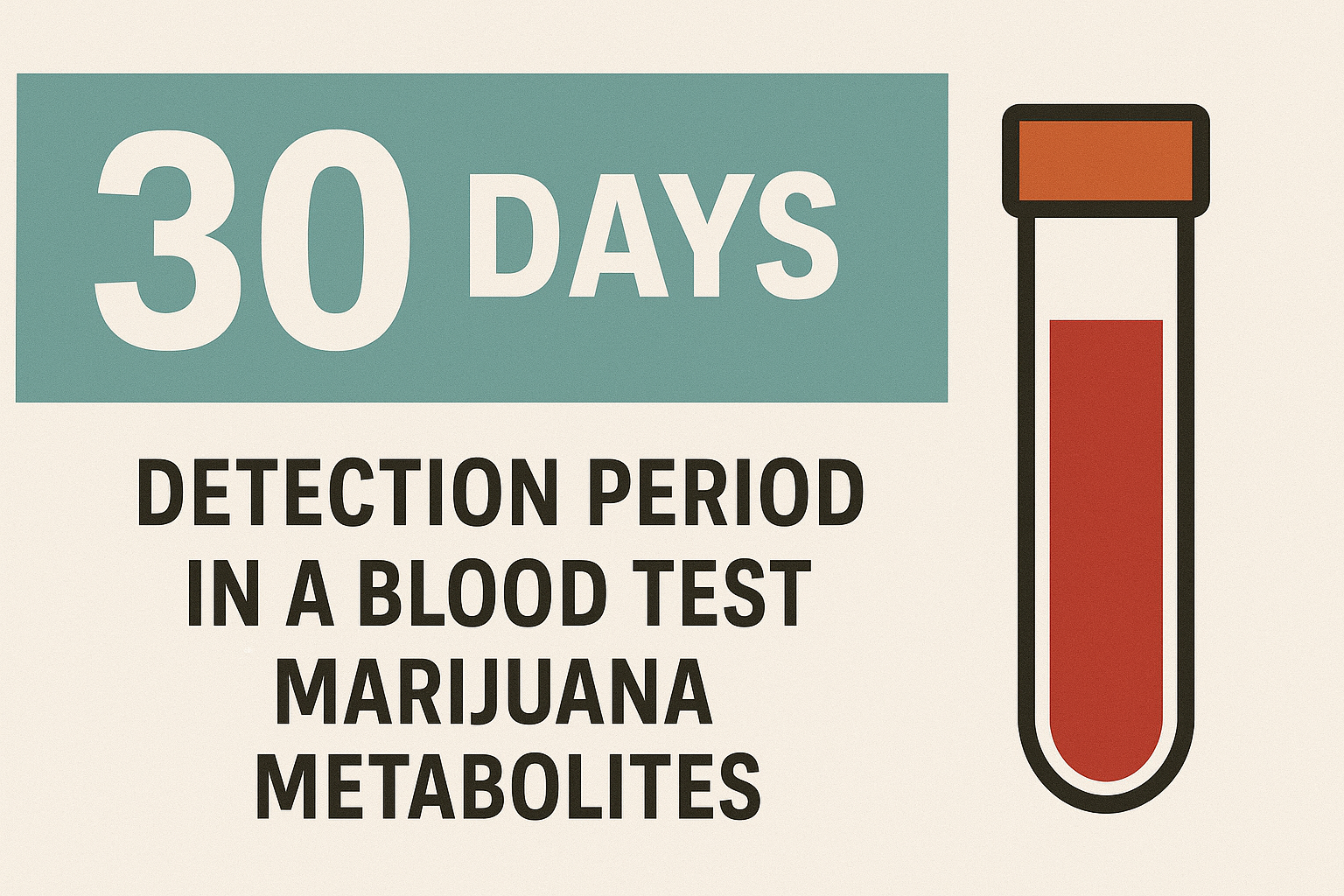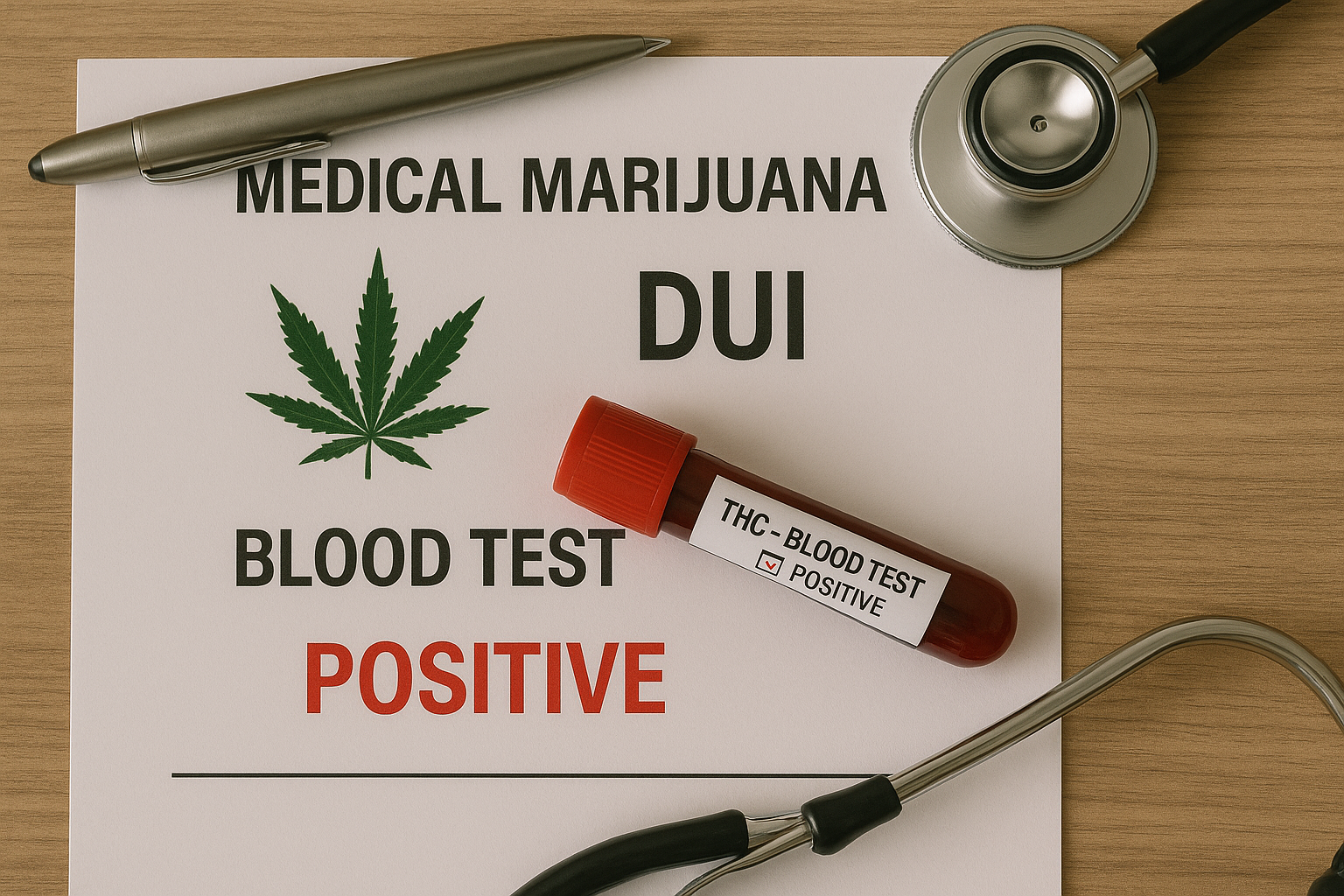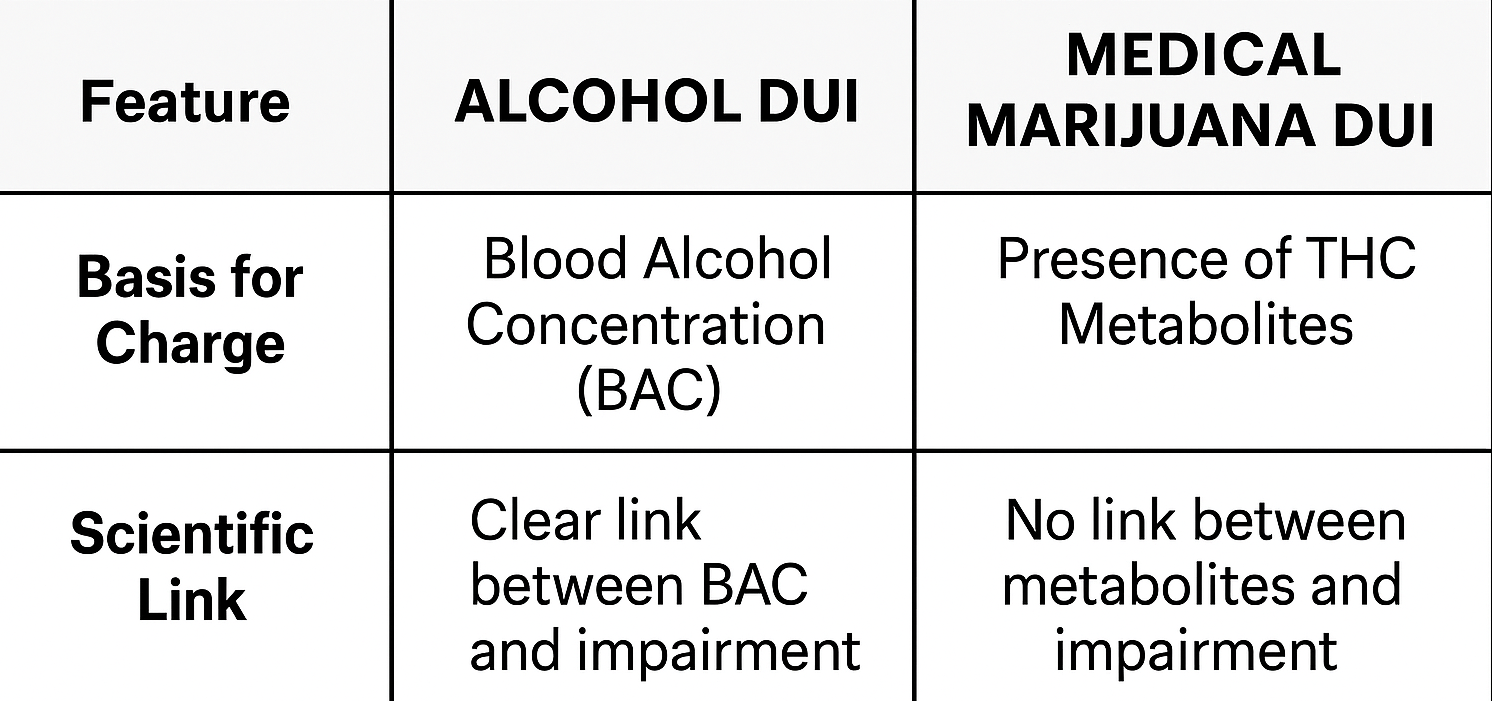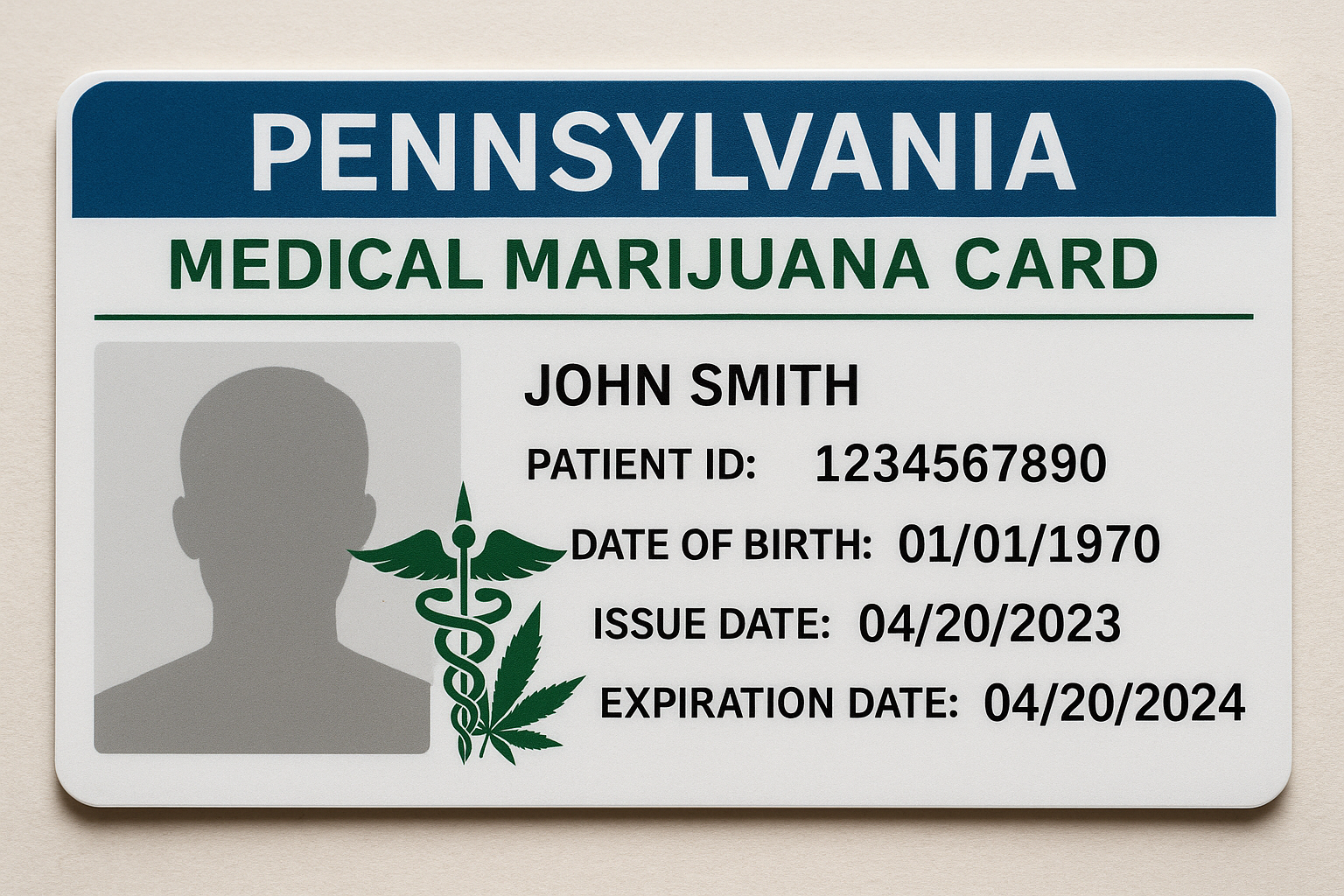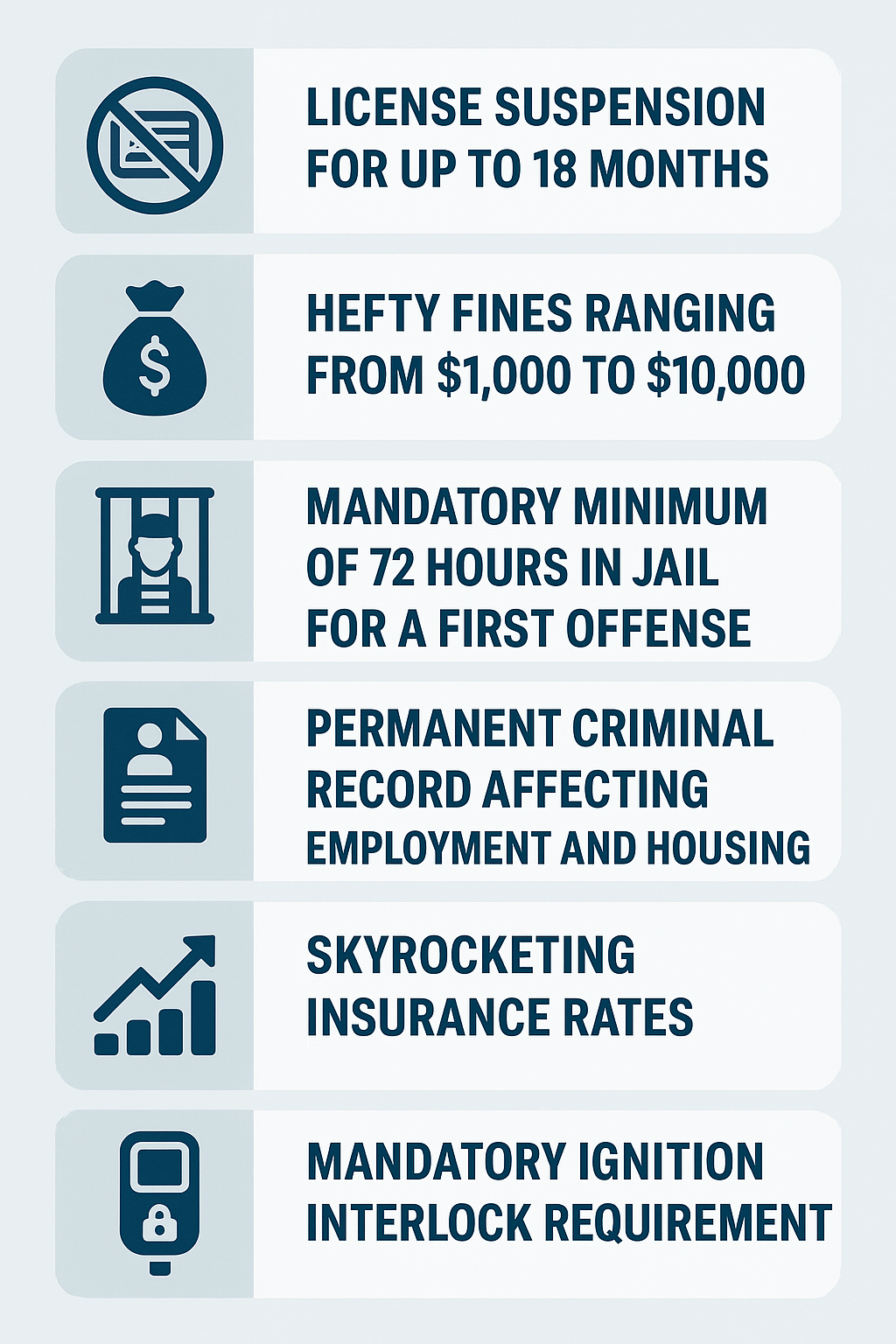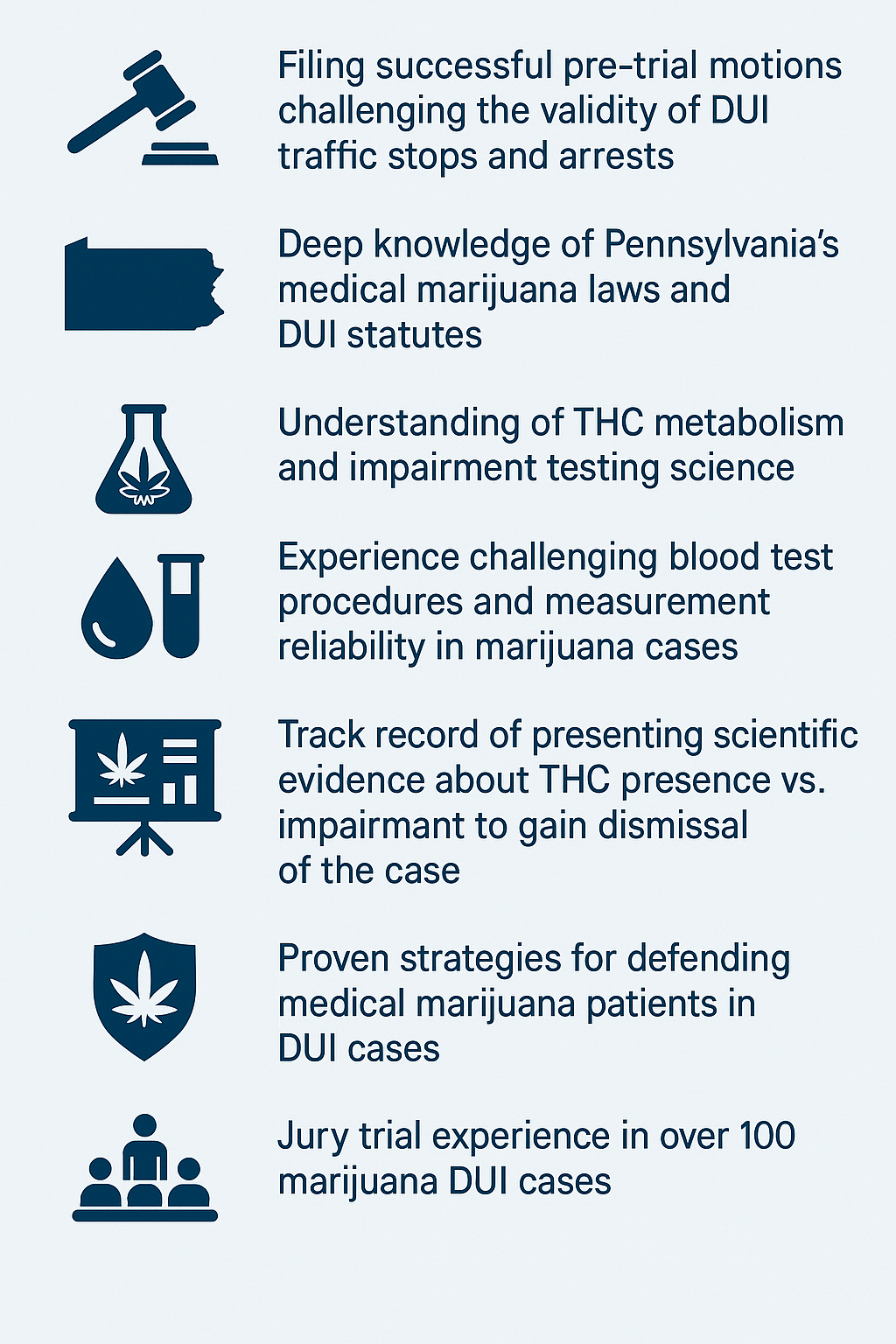Last Updated on August 23, 2025 by Keith E. McAndrews, Esquire

Pennsylvania has over 446,480 registered medical marijuana patients as of April 2025. Marijuana patients in Pennsylvania risk DUI charges, even when sober, because the current law punishes any trace of THC (tetrahydrocannabinol). Science shows that THC can stay in your system long after any “high” is gone. Unfortunately, Pennsylvania’s zero-tolerance DUI law still considers trace amounts of THC as evidence of impairment. In Pennsylvania, two proposed bills could change that by requiring proof of actual impairment before a person could be convicted of a marijuana-related DUI.
Key Takeaways
- In Pennsylvania, even completely sober medical marijuana patients face DUI charges if even trace THC metabolites are found in their blood
- THC metabolite 11-nor-9-carboxy-THC has a long half-life of several days and in very heavy users, several weeks. This allows the police to charge DUI without evidence of any actual impairment. This makes the current Pennsylvania DUI law not just outdated but incredibly unjust
- House Bill 983 and Senate Bill 63, both enjoying bipartisan support, seek to reform Pennsylvania’s DUI law by requiring proof of actual impairment before medical marijuana users can be charged with DUI
- Under the proposed reforms, medical cannabis patients would no longer be charged or prosecuted for prescription cannabis use unless the police can show that they were driving impaired
- With over 440,000 registered medical cannabis patients at risk, the need for reform is urgent. Passing these bills would bring Pennsylvania in line with many other states that have already modernized their DUI laws related to medical cannabis
The Story of a Recent Client of Mine
A client of mine, from Bucks County, PA, took her prescribed medical marijuana on a Sunday evening to manage chronic pain. By Monday morning, she felt completely normal.
She wasn’t groggy, listless, or felling “high.” No effects whatsoever. The police pulled her over later that night for a failing to use a turn signal. After a DUI investigation, her blood test came back positive for THC metabolites.
The result? A DUI charge that put her job and professional license at risk. This story isn’t unique. It happens to some of Pennsylvania’s 440,000 medical marijuana patients every day.
Here’s why this broken system exists, and what two groundbreaking bills could do to change it.
How This Can Happen
THC, the active ingredient in cannabis, is typically detectable in your blood for only 12-24 hours, although chronic users may test positive for up to 30 days. can stay in your bloodstream as long as 30 days after its effects wear off. In Pennsylvania, the minimum detection level for THC is just 1 nanogram per milliliter.
That means you could take a small dose of your legally prescribed medical marijuana today, feel completely sober tomorrow, and still test over the legal limit for DUI days or possibly weeks later. Under current Pennsylvania law, that’s enough for a judge or a jury to convict you of DUI, even without any proof you were driving while impaired.
The problem? Science doesn’t support that THC in your blood always equals impairment. Many states have already updated their laws to reflect this. Pennsylvania has not, but two bills currently moving through the Pennsylvania legislature could finally provide the protection these patients deserve.
Bucks County Marijuana DUI Attorney
Charged with a marijuana DUI in Bucks County, Pennsylvania? Medical marijuana patients deserve protection, not punishment. I’ve also helped people in Philadelphia County, Montgomery County, Chester County, and Delaware County.
Call me at (215) 752-5282 to talk about how to fight your case.
The Problem With Pennsylvania’s Current Marijuana DUI Law
Pennsylvania’s zero tolerance DUI statute makes it illegal to drive with any detectable amount (1 nanogram per milliliter or above) of a Schedule I controlled substance in your blood, including medical marijuana.
The Numbers Don’t Lie
- There are approximately 440,000 registered medical marijuana patients in Pennsylvania
- 1 nanogram per milliliter is the minimum detection level for THC metabolites that can trigger a DUI charge
- 30 days. This is how long THC metabolites can remain detectable in your blood
- No proof of impairment is required to be charged with a DUI connected to medical cannabis use
This isn’t just unfair. It’s not backed by science.
THC vs. THC Metabolites: What’s the Difference?
Active THC
- Refers to delta-9-THC, the active ingredient in cannabis that can cause impairment
- Leaves your system within hours in most people
- Can affect your ability to drive safely (slowed reaction time, poor coordination)
Inactive THC Metabolites
- Inactive breakdown products of THC
- A “chemical footprint” showing you used marijuana
- Remains in your blood for days or weeks
- Has no adverse impact on your driving ability
The Alcohol Comparison
Here’s what makes this current law so unfair to medical marijuana users. Established science has shown that your blood alcohol level directly correlates with impairment. A blood alcohol reading of .08% means you are legally impaired to drive to at least some degree.
In contrast, the presence of THC metabolites has no relationship with current impairment. You could have THC metabolites in your system from weeks ago, causing no effect on your system.
It’s like charging someone with drunk driving because they drank a beer one week ago.
Hope on the Horizon: Two Bills Could Change Everything
After years of injustice, relief for medical marijuana users may finally be coming. Two bills currently moving through the Pennsylvania legislature could end this nightmare for medical marijuana patients. Both bills have bipartisan support and real momentum.
PA House Bill 983: The Game Changer
Pennsylvania House Bill 983, sponsored by Representative Chris Rabb, is similar to PA Senate Bill 63. It has passed the PA House Transportation Committee. It is awaiting Senate action. What it does:
- Removes medical marijuana from the controlled substance category for DUI purposes
- Requires proof of actual impairment for DUI convictions
- Has already passed the House Transportation Committee with bipartisan support
- Currently awaits Senate action
PA Senate Bill 63: Patient Protection Act
Pennsylvania Senate Bill 63 is sponsored by Senator Camera Bartolotta and is currently in committee. A committee vote is expected soon. Key protections include:
- Requires law enforcement to prove actual impairment rather than just detecting THC metabolites
- Prevents the police from using a medical marijuana card alone as probable cause for a DUI arrest
- Protects patients from automatic chemical testing based solely on their medical marijuana patient status
- Maintains penalties for drivers who are actually impaired while operating a vehicle
- Offers the same legal protections given to prescription drug users
What Both Bills Mean for You
Think of it this way: If you take prescription opioids for pain management, you can’t be charged with DUI simply because the medication is in your system. There must be evidence of actual impairment. These bills would extend the same protection to medical marijuana patients.
The bottom line: You’d still be liable if you’re actually impaired while driving. But you can’t be charged simply for having THC metabolites from legal use days or weeks ago.
Why This Matters Now
Passing these bills would align Pennsylvania with other states that have adopted impairment-based or high minimum THC threshold standards in their marijuana DUI laws. Pennsylvania is behind the curve, but these bills could finally bring justice to hundreds of thousands of patients. View how other states have amended their cannabis DUI laws at: Marijuana DUI Laws | Marijuana and the Law
Both bills have bipartisan support, which is rare in today’s political climate. Lawmakers are finally recognizing that science doesn’t support the current zero-tolerance approach.
The passage of either bill would represent a massive victory for medical marijuana patients and common-sense drug policy. Patients who want to support these reforms should contact their state representatives and senators.
Medical Marijuana and Cancer Patients
Many cancer patients live in chronic pain from chemotherapy. Their doctors recommended medical marijuana as a safer alternative to opioids. Many patients use their medications on the weekend.
If the police pull them over during the week for a minor traffic infraction, they are at high risk for being arrested for DUI even if any THC metabolites are detected in their blood.
If the police arrest them, they face DUI charges, license suspension, and nearly $20,000 in legal costs and lost wages. Why These Stories Matter?
This cancer patient is not a criminal. He is a law-abiding citizen using legal medication as prescribed by his doctor.
What are the Penalties for a Marijuana DUI in Pennsylvania?
For more information about penalties for driving under the influence, read my Pennsylvania DUI Penalties page.
What a Change to the Law Will Mean to Pennsylvania Medical Marijuana Patients
Until these bills become law, Pennsylvania’s medical marijuana patients remain vulnerable to DUI charges based solely on metabolite presence. This creates a constant state of anxiety for patients who rely on cannabis to manage serious medical conditions, including:
- Chronic pain
- PTSD
- Epilepsy
- Cancer
- Anxiety
The current law forces patients into an impossible choice: avoid driving entirely or risk criminal charges for following their doctor’s orders. Many patients have reduced their medication use out of fear of legal consequences, compromising their health.
Frequently Asked Questions
How Long After Using Medical Marijuana Should I Wait Before Driving?
Unfortunately, the only way to know for sure is with a confirmatory drug test. No one person clears THC and THC metabolites from their system in the same time frame.
Why Causes THC Metabolite Levels to Change?
THC metabolites can be detected at different levels in your blood for a variety of reasons including:
- Frequency of use (daily users = longer presence)
- Body composition (higher body fat = longer detection)
- Metabolism rate
- Dosage and potency
- Method of consumption
Can I Refuse a Blood Test in Pennsylvania?
Yes. However, Pennsylvania’s implied consent law requires that you provide a chemical test sample if the police suspect you are driving under the influence.
A chemical test refusal results in a minimum 1-year driver’s license suspension followed by an automatic minimum 1-year ignition interlock requirement.
Even though you can refuse a chemical test, most attorneys recommend taking the test and consider fighting the charges, if possible.
Will my Medical Marijuana Card Protect Me from a DUI Charge?
No. Under current Pennsylvania law, your medical card doesn’t provide DUI protection. It only proves you’re legally allowed to possess and use marijuana, not drive with marijuana metabolites in your system.
What should I do if I’m pulled over?
- Stay calm and be respectful
- Keep your hands visible
- Don’t volunteer information about medication use
- Don’t consent to searches
- If arrested, ask for an attorney immediately
What Shouldn’t I do if I am Pulled Over?
- Volunteer information about medication use
- Consent to searches without a warrant
- Discuss your case with anyone except your attorney
- Assume your medical card protects you under current Pennsylvania DUI law
Do Field Sobriety Tests Detect Marijuana Impairment?
No. Standardized field sobriety tests such as Horizontal Gaze Nystagmus (HGN), walk and turn, and one-leg stand were designed to detect alcohol-related impairment.
There is no scientific research showing that these tests can be used to identify someone impaired by marijuana.
When will These New Bills Become Law?
Both bills are progressing through the legislature. House Bill 983 has already passed committee. The timeline depends on legislative priorities, but we could see action in the later part of 2025.
What if I’m Charged Before the Bills Pass?
Contact an experienced medical marijuana DUI attorney immediately. Even under current law, there are defense strategies available. Don’t wait, evidence preservation and early intervention are crucial.
How Much Does a DUI Lawyer Cost?
Legal fees typically range from $3,000-$10,000 depending on case complexity. I offer affordable flat fee rates to accommodate your budget. However, the cost of not fighting, including license suspension, job loss, and insurance increases, is often much higher.
Can I Still be Charged with Medical Marijuana DUI if I Wasn’t Impaired?
Yes. Under current Pennsylvania law. This is exactly what House Bill 983 and Senate Bill 63 aim to change. Until then, any detectable amount of THC can result in DUI charges.
Why Hire Me for Your Marijuana DUI Case?
Bucks County Marijuana DUI Lawyer
Are you a medical marijuana patient in Bucks County facing DUI charges? If so, you need a defense attorney who understands both Pennsylvania DUI laws and the unique challenges of cannabis-related cases.
I have over 15 years of experience defending clients against marijuana DUI charges under Pennsylvania’s strict zero-tolerance law. I know how to challenge blood test evidence, question field sobriety procedures, and fight for your rights.
Call my office today at (215) 752-5282 to discuss your case for free.
